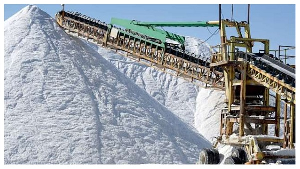- Home - News
- TWI News | TV
- Polls
- Cartoons
- Year In Review
- News Archive
- Crime & Punishment
- Politics
- Regional
- Editorial
- Health
- Ghanaians Abroad
- Tabloid
- Africa
- Religion
- Election 2020
- Coronavirus
- News Videos | TV
- Photo Archives
- News Headlines
- Press Release
- News Blogs
Business News of Sunday, 8 September 2024
Source: imaniafrica.org
Prospects of Ghana's Salt Industry: A pathway to adding an extra $1 billion in foreign exchange earnings
Introduction
Ghana has a thriving salt mining and winning industry that has consistently produced around 250,000 metric tons annually over the last decade. The primary method of salt production in Ghana is through solar evaporation of concentrated sea water in salt pans, usually in areas with sources very close to the sea. Notable among these are the Songor Lagoon area, Keta, Saltpond, and other smaller coastal enclaves.
The Observatory of Economic Complexity indicates that in 2022 for instance, Ghana exported $4.36 million worth of salt. This is 0.022% of Ghana’s total export earnings of $20 billion for the same period. This made Ghana the 59t h largest exporter of salt in the world for 2022.
Any observer’s cursory look at the potential for salt production in Ghana will immediately notice the gross shortfall between potential annual earnings from the salt industry and the actual production. For such observers, this gross underutilization of the resource potential represents a missed opportunity for the salt value chain and its benefits to the country and the African continent as a whole.
A lot of talk and activity has gone into discussing the role of various stakeholders and how they benefit. The raging debate around the beneficiaries have over the years discouraged any significant investment and will to make the best of the resource.
Electrochem Ltd, a Ghanaian owned entity, has recently been a beneficiary of a lease arrangement that puts them in the apex position to make the most out of Ghana and possibly West Africa’s biggest naturally occurring solar salt potential basin, the Songor Lagoon.
At the background of a full parliamentary inquest and the commitment of the company to initiate and comply with a community-focused masterplan that should maximize local participation, there is a clearer path to the projected billion dollar a year dream being fulfilled.
Internal documents sighted show that Electrochem intends to grow annual salt production volumes emanating from the Songor enclave from the usual range of 150,000 metric tonnes annually to about 400,000 metric tonnes annually with the current level of investment over the 2025/6 period. The difference is that the salt production will not be focused on the domestic market, but an international export market with industry-grade quality control measures projecting salt as a mineral commodity.
Revenue projection for 2025 will be around 350-400 million USD based on projected production based on current infrastructure. After subsequent investment rounds and infrastructure development spanning four years, it is expected that the Songor area alone will yield up to 1.5 million metric tonnes annually, leading to potential revenues in the region of upwards of 1 billion USD from 2028 onwards.
Read the full policy brief below:
Watch the latest edition of BizTech below:
Ghana’s leading digital news platform, GhanaWeb, in conjunction with the Korle-Bu Teaching Hospital, is embarking on an aggressive campaign which is geared towards ensuring that parliament passes comprehensive legislation to guide organ harvesting, organ donation, and organ transplantation in the country.
Click here to follow the GhanaWeb Business WhatsApp channel
Entertainment










